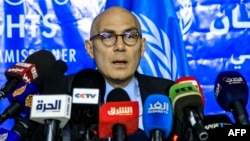The U.N. High Commissioner for Human Rights on a visit to Sudan has urged authorities to respect human rights as a core of the country's transition to democracy. At the end of his four-day visit to Sudan, Volker Tuerk said justice and accountability must be expedited for victims and survivors of rights violations.
The U.N. rights chief said his office has documented serious human rights violations in Sudan in the last few years and yet no one has ever been held accountable.
Speaking at a press conference late Wednesday in Khartoum, Tuerk also cited more recent excessive use of force against protesters in Khartoum.
He said since the military coup in October last year, the use of live ammunition by security forces against pro-democracy protesters killed at least 119 people and injured more than 8,000 others.
Tuerk said his office also has verified 19 cases of sexual and gender-based violence, most of them committed by Sudanese police during the protests.
He said there were likely more that go unreported due to social stigma, lack of faith in Sudan’s justice system, and fear of reprisals.
“We have, over the years, documented violations by all security forces and by many armed actors, and it is really important to follow up on this and that is why we have established a very close cooperation in order to ensure that the national action plan for the protection of civilians gets implemented,” he said.
Tuerk said rights activists and internally displaced people in the Darfur region reported widespread impunity for rights abuses, including by Sudan’s Rapid Support Forces.
The U.N. rights chief said his office documented 11 large-scale clashes that left more than 1,000 people dead since January 2021.
He called on all sides involved in Sudan’s political process to work toward prompt restoration of civilian rule and stressed the need for accountability and justice.
“In my discussions with the authorities, I consistently highlighted the need for trust building measures to earn the confidence of the people,” he said. “I stressed an important point that the respect for human rights builds trust.”
Human Rights Watch researcher Mohammed Osman said the U.N. rights chief’s trip to Sudan came at a crucial time as the political transition seems stuck behind closed doors.
Osman said such a political process is likely to lack inclusivity and transparency, and most importantly, about justice and accountability for the victims of scores of violations that happened in the past.
“Quite crucial, to be honest to see the situation being placed under rights focused scrutiny that would not allow the dynamics of political experience and convenience that surrounded the previous transition and still surrounding the reported negotiations in Sudan to prevail,” Osman said.
Tuerk met late Wednesday with the head of Sudan’s ruling Sovereign Council and military leader General Abdel Fattah al-Burhan.
Speaking shortly after that meeting, the head of Human Rights department at the Sudanese Foreign Ministry, Essam Mutwali, said the government was committed to respect for human rights.
Mutwali said authorities were working to expedite the political process to restore Sudan’s civilian-led transitional government.
He said during the meeting with the Tuerk, al-Burhan expressed a readiness to cooperate with the international community.
Mutwali said al-Burhan is keen and committed to all the international and regional treaties that Sudan has ratified. Most importantly, he said, those that respect human rights.
Sudan’s army chief al-Burhan led a military coup in October last year that ousted the civilian bloc from a power-sharing transitional government.
The coup was widely condemned, cut off Sudan from international financing, and sparked near-weekly street protests against military rule and in support of democracy.




